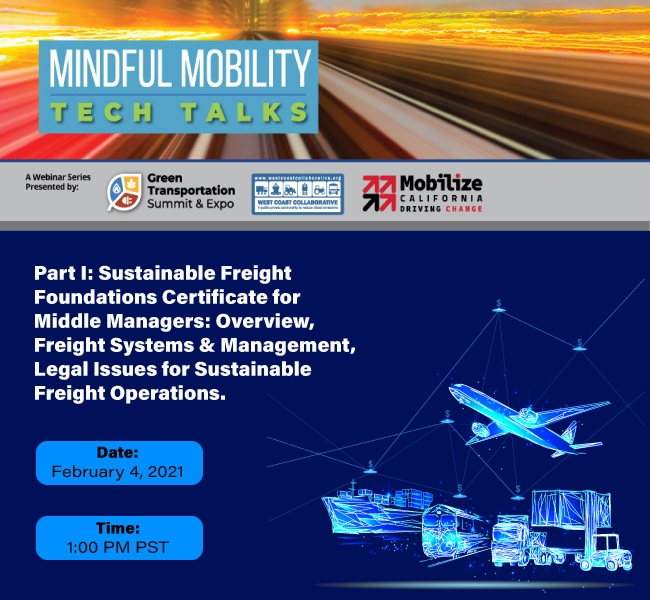News | Sustainable Freight Certificate Garners National Audience with the Mindful Mobility Tech Talk Series
Stop the VideoNews

Sustainable Freight Certificate Garners National Audience with the Mindful Mobility Tech Talk Series
Thursday, April 1, 2021
Since its founding in 1998, METRANS has sought to fulfill its ongoing mission to solve metropolitan transportation problems through research, education and outreach. This mission has progressed beyond state borders and led to greater outreach on a national scale through members of the center and its partners. Recently, the Columbia-Willamette Clean Cities Coalition, Mobilize California (MobilizeCA), Advanced Transportation and Logistics (ATL), and the Green Transportation Summit and Expo (GTSE) invited CITT and METRANS members to present a three-part Tech Talk series on the recently piloted Sustainable Freight Foundations Certificate. The certificate was developed in partnership with the California Energy Commission and the Governor’s Office of Business and Economic Development (GO-Biz). This 40-hour digitally held training curriculum combines freight systems management with energy systems management, compliance issues and digital skills building.
The certificate is only a part of a larger METRANS research project that is supporting implementation of the California Sustainable Freight Action Plan (CSFAP). The purpose of the research is to understand the impact of the plan’s implementation on the State’s economic competitiveness and its workforce. California is at the forefront of environmental sustainability in freight, setting an example for other states as a best practice. It is imperative to develop improved methods and tools to assess the various impacts associated with transitioning the transportation industry to a zero emissions future, including the economic impacts of state actions. Consisting of two parts, the project (1) develops competitiveness metrics that would allow the State to assess the impact of policy and regulatory measures on the freight sector, particularly in relation to other locales, and (2) examines the opportunities and challenges created by CSFAP on the freight workforce. A component of the latter involved the development of a 30-hour Sustainable Freight Foundations Certificate.
The Sustainable Freight Foundations Certificate is a pilot program designed to solve the apparent workforce development gap in education and training for workers trying to succeed in mid-level management positions. In the February 2021 Mindful Mobility Tech Talk series, METRANS Deputy Director Tom O’Brien, CITT Education and Workforce Program Developer Deanna Matsumoto, and CITT Research Associate Diana Sanchez, as well as CITT program instructors Cameron Roberts, Kevin Maggay, and Matt Schrap presented a high-level overview of this first-of-its-kind certificate to a national audience of over 100. The audience included manufacturers (OEMs); federal, state, and local government; railroads; freight forwarders; ports; retailers; drayage/trucking; warehousing; environmental agencies; distribution centers; inland and seaports; energy-related organizations; and Institutes of Higher Education.
Sanchez presented the research methodologies used in identifying sustainable freight occupations; the knowledge, skills, and abilities (KSAs) needed in the workplace and the instructional design and delivery models that would be most effective. As 15 states and Washington, D.C. have adopted California’s vehicle emission standards under Section 177 of the Federal Clean Air Act, Matsumoto noted that there is interest in expanding the Sustainable Freight Foundations Certificate to a national audience. Adoption of these standards will necessitate workforce development training in sustainable freight in nearly one-third of the U.S. O’Brien discussed the possibility of expanding this initial certificate program into a more comprehensive industry-recognized certification. Roberts, Maggay and Schrap discussed how each of the current modules (e.g., Freight Management, Energy Fundamentals, Compliance, and Digital Applications) can be developed into its own certificate, taking a deeper dive into each module. Continued collaboration will focus on developing more partnerships with industry, community colleges, and universities to create credit and/or non-credit courses to increase job readiness and marketability in the freight workforce.
To watch the Mindful Mobility series, please check:

News Archive
- December (1)
- November (6)
- October (4)
- September (2)
- August (3)
- July (4)
- June (3)
- May (7)
- April (8)
- March (11)
- February (8)
- January (7)
- December (7)
- November (8)
- October (11)
- September (11)
- August (4)
- July (10)
- June (9)
- May (2)
- April (12)
- March (8)
- February (7)
- January (11)
- December (11)
- November (5)
- October (16)
- September (7)
- August (5)
- July (13)
- June (5)
- May (5)
- April (7)
- March (5)
- February (3)
- January (4)
- December (4)
- November (5)
- October (5)
- September (4)
- August (4)
- July (6)
- June (8)
- May (4)
- April (6)
- March (6)
- February (7)
- January (7)
- December (8)
- November (8)
- October (8)
- September (15)
- August (5)
- July (6)
- June (7)
- May (5)
- April (8)
- March (7)
- February (10)
- January (12)















